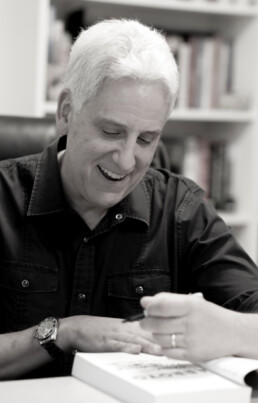Chip Jacobs

Chip Jacobs is a bestselling author and prize-winning journalist.
His forthcoming book is Later Days, a loosely affiliated sequel to his debut novel Arroyo, historical fiction set around construction, in 1913, of Pasadena, California’s mysterious Colorado Street Bridge. It was a Los Angeles Times bestseller, CrimeReads most anticipated book, and Independent Book Publisher Award winner. In 2021, he rolled out The Darkest Glare: A True Story of Murder, Blackmail, and Real Estate Greed in 1979 Los Angeles, a black-comedy, true crime story that Kirkus Review praised as “engrossingly bizarre” and “entertaining.” Before them, he penned the biography Strange As It Seems: the Impossible Life of Gordon Zahler, an Indies Book of the Year finalist, as well as two environmental social histories, both co-written with William J. Kelly: the international bestselling Smogtown: the Lung-Burning History of Pollution in Los Angeles and The People’s Republic of Chemicals. He has also contributed pieces to anthologies, among them Los Angeles in the 1970s: Weird Scenes Inside the Goldmine and Go Further: Literary Appreciation of Power Pop. His writing has been honored by, among others, the Independent Publisher Book Awards (IPPY), the Indies Book of the Year contest, Foreword and Booklist magazines for top books in their genre, The Green Prize for Sustainable Literature, the Southern California Book Festival, the Shanghai Book Awards and as a Chinese “Most Influential” and “Outstanding Popular Science” book. He and his literary subjects have appeared in the Los Angeles Times, The New York Times, The Wall Street Journal, Marketplace, C-Span, Bloomberg, Wired, Slate, Politifact, NPR-syndicated stations, the South China Morning Post, CrimeReads, the Los Angeles Review of Books, and elsewhere. He’s currently at work on a history of the Long Beach Freeway fight, the longest, fiercest, and most entertaining highway saga in American history. Click here for his Book-trailer Youtube page.
On the journalism side, Jacobs’ reporting and opinion pieces have been published and aired in the Los Angeles Times, Los Angeles Daily News, The New York Times, CNN, L.A Weekly, the Southern California News Group, the Los Angeles Business Journal, the Pasadena Weekly, and other outlets. He’s covered everything from secret military aircraft and controversies surrounding LA’s billion-dollar subway network to deadly pollution left behind by defense contractors and the cold-case murder of a suburban mayor; in features, he’s explored hamburger-chain empires, predatory realtors, plucky senior-citizen activists, and the renaissance of a disgraced LA councilman. His stories have prompted multiple investigations; influenced Congress on environmental fraud; helped inspire state laws relating to water pollution, slum housing and redevelopment; and stopped millions of dollars in wasteful public spending. For his efforts, he’s won seven Los Angeles Press Club/Southern California Journalism Awards, as well as ones from the California Newspaper Publishers Association, the Association of Alternative Newsweeklies and the Los Angeles Times.
Jacobs grew up in northeast Pasadena. In 1985, he graduated from the University of Southern California with BAs in journalism and international relations. In 1988, he earned his MA in international relations, emphasizing national security affairs, from The American University in Washington, D.C. Jacobs broke into journalism in 1990 at The Los Angeles Business Journal. His passions include Trojan football, life as a Beatles-worshipper, electric guitar, forgotten literature, running and super-sugary breakfast cereals. He lives in Southern California.

